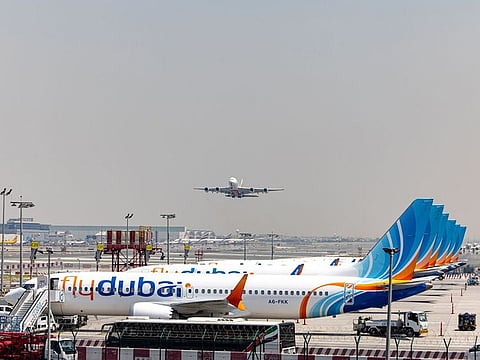flydubai’s 2024 expansion plans stunted by extensive delays in Boeing’s aircraft delivery schedules, says CEO
Reduced capacities could impact airline’s projected financial performance, said Al Ghaith

Dubai: flydubai, Emirates’ sister airline, revealed that its expansion plans have been significantly disrupted due to Boeing’s latest update on aircraft delivery delays. No new aircraft are joining its fleet for the remainder of the year following the latest update it received from the manufacturer.
Ghaith Al Ghaith, CEO of flydubai, said, “The reduced capacity will ultimately affect our customers as well as our projected financial performance.” Originally, flydubai had planned to receive 14 new aircraft this year. The airline is now exploring all possible options to minimise the impact of these delays.
Fewer aircraft delivered this year have added pressure on flydubai’s fleet utilisation. With six new routes scheduled to launch over the next few months, the all-Boeing carrier is reviewing its schedule and frequency of operations across its network. The airline has urged Boeing to honour and renew its commitment to meet its delivery obligations, which rely heavily on the timely addition of new aircraft to the fleet.
Al Ghaith said, “We are extremely disappointed to learn that Boeing will not be able to fulfil its commitment to deliver more aircraft for the remainder of the year.”
He added, “Boeing’s short-noticed and frequent delivery schedule revisions have hindered our strategic growth plans, resulting in significant disruptions to our published schedules.”
Original Equipment Manufacturers like Boeing and Airbus are scrambling for raw materials and components while dealing with a reduced workforce. The need for more raw materials primarily drives parts shortages, and some inventory is becoming scarce.
Fewer aircraft delivered annually
Ongoing challenges with Boeing’s delivery schedule resulted in fewer aircraft being delivered yearly for the past three years. flydubai operates a single fleet of 88 Boeing 737 aircraft, including 29 Next-Generation Boeing 737-800, 56 Boeing 737 MAX 8, and three Boeing 737 MAX 9 aircraft.
Multiple revisions of the 2024 delivery schedule meant that Boeing would not deliver the 14 Boeing 737 MAX aircraft originally scheduled for the year. The aircraft delivered in the first half of the year were from the backlog of previous years and faced extensive delays. flydubai has more than 125 Boeing 737 MAX aircraft that will be delivered over the next decade. The carrier placed its first wide-body order for 30 Boeing 787-9s at the Dubai Airshow last year.
Operational and cost implications
The carrier said it had to enter Aircraft, Crew, Maintenance and Insurance (ACMI) agreements, a type of leasing agreement where the lessor provides all elements of ACMI to the lessee in return for a payment based on the number of block hours operated, as part of its mitigation efforts. Typically, these contracts are shorter, ranging from 6-18 months.
The carrier said it has also extended the lease on some of the aircraft scheduled to be returned to the lessors under its Sale and Leaseback agreements, which has led to the airline incurring further costs, said the CEO. flydubai has also invested in an extensive retrofit programme for its Next-Generation Boeing 737-800 aircraft fleet to ensure a more consistent onboard experience for its passengers and to align the cabin product in the absence of new aircraft joining the fleet for the remainder of the year.
The carrier is one of the largest operators of Boeing 737 MAX aircraft in the Middle East and GCC, and its growing fleet has supported its ambitious growth plans over the years.
“flydubai has always valued its longstanding partnership with Boeing, and the airline and the manufacturer have been resilient and agile in tackling challenges over the years. We urge Boeing to take immediate action and implement measures to stabilise its production and delivery processes to avoid further delays while upholding the highest standards. We look forward to swiftly resolving this issue,” added Al Ghaith.
Boeing has faced significant challenges in recent years, including production delays and quality issues. The company has struggled with setbacks in its 737 MAX programme, which was grounded globally for over 20 months due to safety concerns following two fatal crashes. Although the 737 MAX has since returned to service, Boeing continues to grapple with supply chain disruptions, production bottlenecks, and financial impacts from these issues.
Sign up for the Daily Briefing
Get the latest news and updates straight to your inbox



